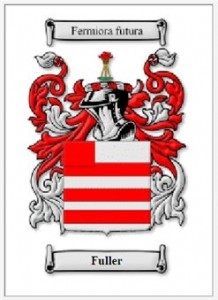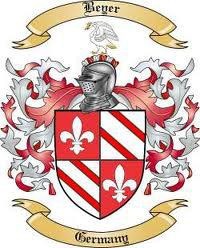 For many people researching the family history means looking for things like famous ancestors, family occupations, historical locations, and eventually the family crest, also known as the Coat of Arms. The problem with the family crest is that there are so many, and the process to make a legal claim to one is difficult, because the right to bear arms in the legal sense of a coat of arms, must be researched and proven through attested Genealogical records. Of course, this doesn’t mean that people can’t pick out a crest that bears their name and use it, even without the legal documentation. They can be displayed as decorative reproductions, derived only from the association with your name. That use, while legal in the sense that you are not committing a crime, is not the legal right to bear arms that is normally associated with the crest.
For many people researching the family history means looking for things like famous ancestors, family occupations, historical locations, and eventually the family crest, also known as the Coat of Arms. The problem with the family crest is that there are so many, and the process to make a legal claim to one is difficult, because the right to bear arms in the legal sense of a coat of arms, must be researched and proven through attested Genealogical records. Of course, this doesn’t mean that people can’t pick out a crest that bears their name and use it, even without the legal documentation. They can be displayed as decorative reproductions, derived only from the association with your name. That use, while legal in the sense that you are not committing a crime, is not the legal right to bear arms that is normally associated with the crest.
Sometimes, for those who are very fortunate, the family coat of arms might be found in a grandparent’s attic, but most of us will not discover our true coat of arms in this manner. Because of the difficulty in locating the necessary information to claim a legal right to a family coat of arms, most people just don’t bother with this part of a full family history. According to LG Pine, author of Heraldry And Genealogy, “At the onset, there is a curious fact in the relationship between the two subjects. While students of Heraldry do take to Genealogy, and acquire a considerable knowledge of it, those who begin as genealogists seldom if ever take any interest in Heraldry. This is most unfortunate, because the two subjects are necessarily related.” I suppose this is true, but once you have stumbled upon a family coat of arms in your research, like I did a few years ago, you simply do become intrigued.
Nevertheless, I had no idea about the legal right to bear arms until I was doing some research into the coat of arms of the Leary side of Bob’s family the other day. I had found several family coats of arms for the Spencer, Byer, Pattan, Fuller, and Schulenberg sides of the family, and planned to look for some of the others in the near future. While I will still do that, I have to wonder about the accuracy of the ones I have, and just how  difficult it will be to verify their validity. I can see that I will need to do some research on just how to move forward on this matter in the correct way.
difficult it will be to verify their validity. I can see that I will need to do some research on just how to move forward on this matter in the correct way.
The biggest obstacle I see in researching Heraldry or Genealogy is that the spelling of names changes. Whether it is because the person moved to a new nation and was made to change their name or spelling, or like many people do with their first names these days, the person experimented with the spelling of their last name. William Shakespeare was known to spell his last name Shakespeare, Shakespere, Shakespear, Shakspere, and Shaxpere. So to the researcher, I suppose it would be a matter of searching for documentation under multiple different spellings. You can see that the further you get into a search, the more difficult it is to determine the accuracy. So now apply that to the search concerning the legal right to bear arms, and I think you might have the answer as to why so many people avoid this area of research altogether.


Leave a Reply